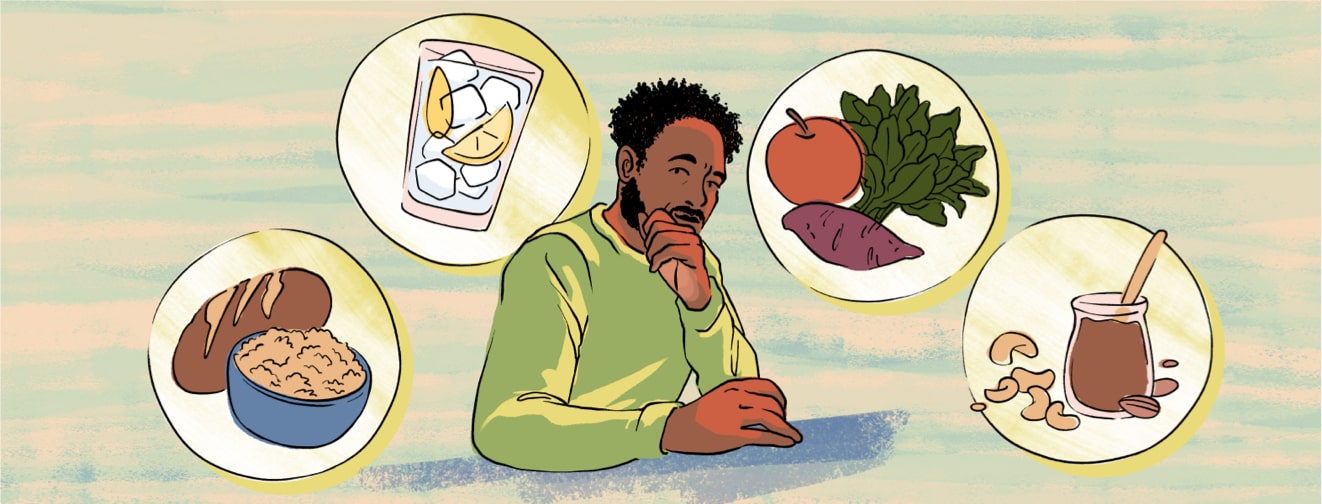My Experience With Switching Diets
"Eat this, not that!" screams the advertisement on TV. That phrase sure captures the history of living with ulcerative colitis or Crohn's.
For years, gastroenterologists handed me a printed out page of a "low-residue diet" (LRD) and sent me out the door. This course of eating limits dietary fiber and restricts certain foods that stimulate bowel movements. For me, I found that it rarely helped.
Switching from low-residue to vegetarian
Fast-forward years later, mid-life found me trying a fresh approach to eating. At age 50, I began worrying about the impact of food choices on longevity for not only me but for my husband, too. After extensive research, we adopted the vegetarian approach.
At first, I worried that all the fruits and vegetables might conflict with my UC, but I learned real fast that didn't happen. As a matter of fact, my digestion improved. I believe the vegetarian diet became one major contributing factor that helped my gut go into UC remission.
A decrease in UC symptoms and pain
By becoming vegetarians, my husband and I also noticed improved changes in our bodies. Inflammation ceased to create the normal aches and pains of aging. My husband's arthritis didn't bother him as much, and I got to enjoy time without the constant running to bathrooms wherever I ventured. Physically, we felt good — better than we had felt in years.
But over time, we noticed a change. Weight accumulated, and the daily bloating from all the beans and vegetables kept us feeling uncomfortable. Plus, we both seemed to be hungry around the clock. It felt as if our bellies were never "full."
Weight gain and switching it up again
So, after 3 years of this vegetarian lifestyle, I decided I needed to get my weight gain under control. Although I loved the beans, fruits, vegetables, and brown rice, I disliked the results it created on my short stature. My clothes kept getting tighter, and it was painful just bending over to tie my shoes. That's when I decided on another dietary path.
My next approach was to return to a low-carbohydrate diet, like I once did years before switching to a vegetarian diet. But this change has presented its own issues.
What about a low-carb diet?
Here's what I've noticed about my poor old gut since I navigated to a low-carb diet: First, my gut now rails against certain meat products. The throbbing pain results within a couple of hours of eating red meat. Pain that causes me to hunch over or curl up tight in the fetal position. So, red meat is out for me.
If my gut doesn't like it, and I must follow my gut. Not listening to intestinal messages isn't possible for someone with IBD. I've learned this valuable insight by living with UC for over 3 decades.
Red meat, rectal bleeding, and a UC flare
In addition, rectal bleeding returned with introducing red meat. I ended up back into a UC flare, but the stress of my job also contributed to this.
So, I called my doctor, who put me on a short round of prednisone. While that helped, I also realized that I could no longer eat certain meats. My body just can't process it like it once could.
Joint pain and dietary confusion
Another downside to a low-carb approach arrived through the return of aches and pains. Yes, I can literally feel inflammation in my body. My joints and plantar fasciitis send out their own red-flag messages. That might sound a bit wacky, but it's true.
I know my body. I pay attention to it. It tells me that if I eat certain foods, I will end up sore, achy, and have difficulty digesting my meals. But what's a person to do when a particular diet offers both good and bad results?
"Everything in moderation"
From my dad, I learned the philosophy, "everything in moderation." If I avoid extremes, I think I can find a "happy medium" — even when it comes to my digestive system. So, I'm approaching my eating from this perspective.
What results have I seen?
Well, I can first attest that my weight has dropped back down to its pre-vegetarian state. Please don't misunderstand me. I don't mean to come across as "superficial," but I like the lighter version of myself. It fits better in my clothes. Besides, I got to where I couldn't afford to go out and buy a whole new wardrobe.
My UC "dragon" has calmed down
In addition, my UC dragon (a.k.a., my gut) has calmed itself. It no longer thunders and roars after the food I feed it. Now, I make sure I eat some sort of fish 2 or three 3 per week. My gut has never lashed out over baked or grilled (not fried) fish. So, I know it’s always a "safe" food choice.
Also, I avoid red meat. I know if I eat it, I'm going to pay the price for it physically.
Finally, I still grab fruits, vegetables, and beans – in small amounts. Years as a vegetarian have taught me to reduce my intake of these beloved food items. In other words, I still enjoy healthy benefits without all the added carbs. To me, this is moderation.
UC triggers and diets can change over time
In the end, "eat this, not that" stands for a phrase that those of us with IBD know all too well. We must stay vigilant about "trigger" foods. If not, our digestive system will communicate its own unfriendly messages. I prefer to approach my diet in a kinder, gentler way. Experience has taught me better.
What diet experiences can you share? We'd love to hear from you. Please comment about what food choices work for you.

Join the conversation